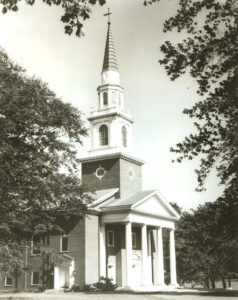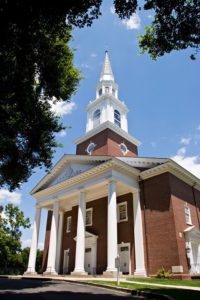A Southern Baptist Convention agency head and former colleague suggests renaming the chapel at Southern Baptist Theological Seminary after its current president, Albert Mohler.
“Southern Seminary has a list of presidents who are renowned – James P. Boyce, E.Y. Mullins, John Broadus, Duke McCall,” Russell Moore, head of the SBC Ethics and Religious Commission, said in a recent podcast reflecting on Mohler’s 25th anniversary as ninth president of the seminary founded in 1859.

Alumni Memorial Chapel was dedicated in 1950 as a replica of the historic First Baptist Church Atlanta. The chapel’s pulpit has been filled by many influential Christian leaders like Martin Luther King Jr. and Billy Graham. (Photo/SBTS archives)
“I actually think that Al Mohler is her greatest president, because he wasn’t just another academic CEO,” said Moore, who has related to Mohler over the years as his student, research assistant, faculty member, dean, provost and now as fellow entity head. “He really was – even as we have an alma mater, a mother – we had in him an alma pater, we had a father.”
“That’s one of the reasons why if I were on the trustee board there at Southern, I would really want to name that chapel after him,” Moore commented. “It’s called Alumni Chapel right now, but so many of the defining-the-vision moments that have happened over the past 25 years all happened there.”
Moore said it also fits because Mohler “sums up the alumni.”
“He was a son of Southern Seminary,” Moore looked back on his time at the seminary in Louisville, Kentucky. “He loved it … but also he represents all of us who came to the school and the people who will come to the school who came there because he preserved it in her time of greatest crisis.”
Moore, who began doctoral studies at Southern shortly after hearing Mohler speak for the first time at the Southern Baptist Convention annual meeting in 1995, termed the current president “a rescue flair for an entire generation of Southern Seminary alumni.”
“What he recognized was that in the controversy that was taking place in our wing of evangelicalism, he knew what was going on,” Moore said. “He knew that the sort of acids-of-modernity that was represented by the theological left, it couldn’t provide a future. It was enfeebling the kind of supernaturalism that is necessary for Christianity to go forward.
“But he also recognized … that you couldn’t just replace one party with the other. There’s a kind of obscurantist fundamentalism, he said at one point, that also cannot move Christianity forward and actually in many ways just speeds along liberalism.”
 “He knew that affirming the inerrancy of the Bible is important, and that was the point of controversy at the time, but you wouldn’t be able to actually conserve much of the gospel if you had simply an inerrant table of contents for the Bible with people who didn’t know what the story of Scripture was and how to fit it together,” Moore said. “It couldn’t be, as he put it at a later time, simply a weekly recitation of John 3:16 and y’all behave yourselves.”
“He knew that affirming the inerrancy of the Bible is important, and that was the point of controversy at the time, but you wouldn’t be able to actually conserve much of the gospel if you had simply an inerrant table of contents for the Bible with people who didn’t know what the story of Scripture was and how to fit it together,” Moore said. “It couldn’t be, as he put it at a later time, simply a weekly recitation of John 3:16 and y’all behave yourselves.”
“What we needed was a deep grounding in the truths of Scripture that could be articulated confessionally and lived out congregationally,” Moore said. “And what he said was that’s going to require both doctrinal orthodoxy and academic rigor.”
Moore’s current estimation is a far cry from the first time he ever heard Mohler’s name, shortly after his election as president of Southern Seminary in 1993.
“I remember right after he was elected, I was in a campus ministry at the University of Southern Mississippi, and people were giving prayer requests, and one of them said we need to pray for Southern Seminary, because there’s a young, new president who has been elected, and he’s going to destroy the school,” Moore said. “So we just need to pray that he does not succeed in those plans.”
“Well, I didn’t know anything about him or Southern Seminary, but I was called on to pray,” Moore told the story. “So I prayed that God would frustrate the plans of Al Mohler. I just had no idea who he was or what he was doing. Thankfully God did not answer that prayer, because God did not frustrate the plans of Al Mohler.”
Previous story:
Celebrating 25 years in job, seminary president remembers rocky start
